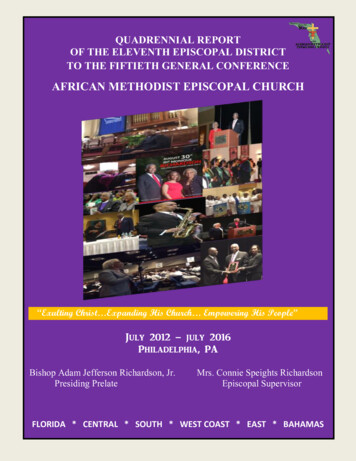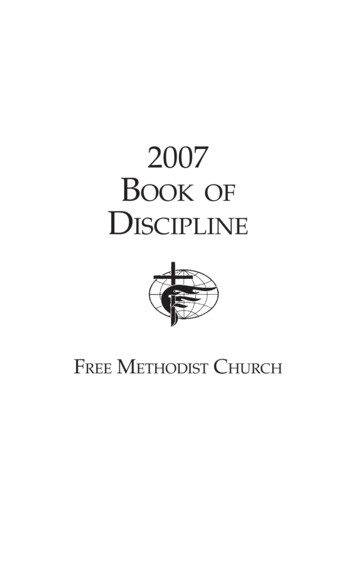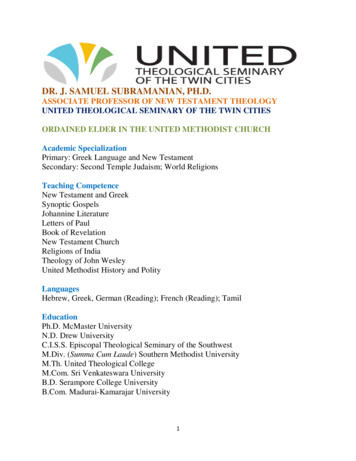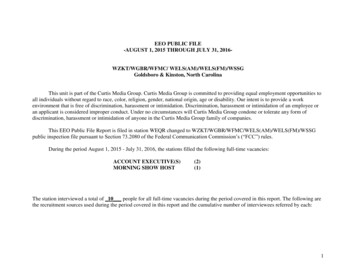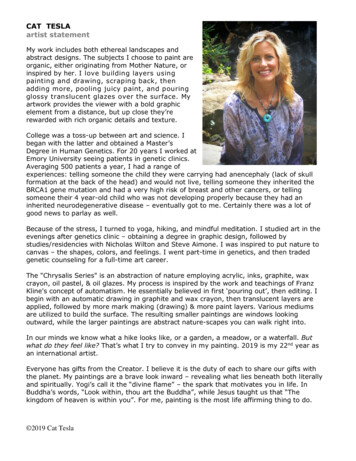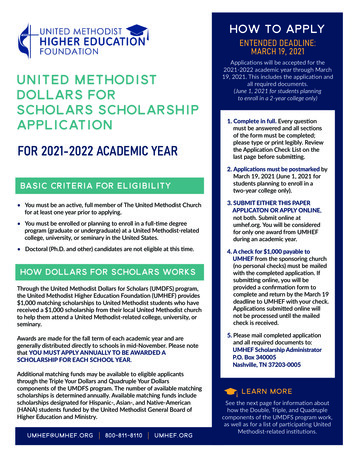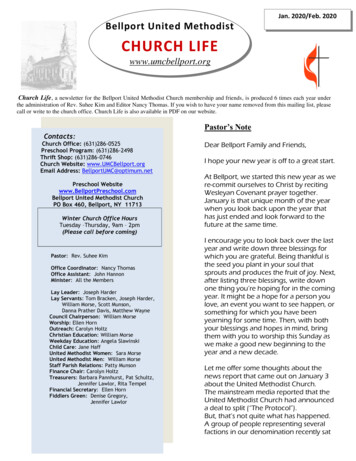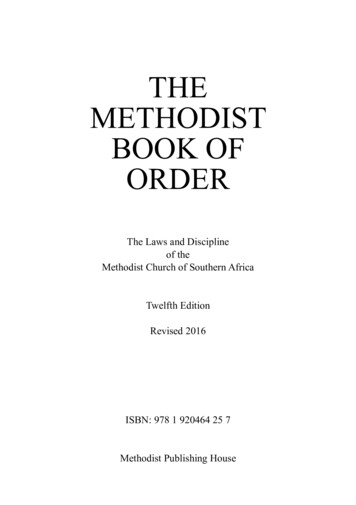
Transcription
1The Methodist Book of OrderTHEMETHODISTBOOK OFORDERThe Laws and Disciplineof theMethodist Church of Southern AfricaTwelfth EditionRevised 2016ISBN: 978 1 920464 25 7Methodist Publishing House
2The Methodist Book of Order
3The Methodist Book of OrderForewordThe Laws and Discipline is an ecclesiastical and organisational tool that is meantto assist in the effective and orderly governance of the Church. It is a blend ofhistory, doctrine, policy, ordinances and guidelines that have been agreed upon bypast Conferences. The Laws and Discipline is therefore the official Constitutionof The Methodist Church of Southern Africa. It represents the heart and visionof the Methodist people. It is the most current statement of how the people calledMethodists agree to live their lives together in this Connexion.This revised twelfth edition takes effect from 1 August 2016. It is appropriately titled‘The Methodist Book of Order’, in the true Wesleyan spirit of accountability andmethodical conduct. It incorporates all the amendments and new legislation enactedthby Conference and/or Connexional Executive since the publication of the 11 editionthin July 2007, plus necessary amendments to the 12 edition of 2014.Effort is made to make it more user friendly by including a detailed index, reorganisingthe contents, ensuring proper numbering, using inclusive language and eliminatingunnecessary repetition. It is hoped that readers would find, as indicated in paragraph11.1 of this edition, that the true spirit of Methodist discipline requires that it beexercised in harmony with the grace of Christ, with tenderness, patience and fidelity,seeking rather to win members back to Christ than to discontinue them.I extend my deep gratitude and appreciation to the members of the RevisionCommittee, the General Secretary, Rev Charmaine Morgan, the Human ResourcesDirector, Rev Dr Vukile Mehana and the Office Administrator, Ms Vanessa Peters,who contributed immensely to the writing and editing of this edition.I am confident that Methodism in Southern Africa will continue to grow as westeadfastly “hold fast the doctrine, spirit and discipline with which we first set out”to accomplish our vision of A Christ healed Africa for the healing of nations.I pray that this revised twelfth edition of the Methodist Book of Order will be a usefulresource to guide the church in effective ministry under the direction of the HolySpirit as together we live and serve our Master.Ziphozihle D SiwaPresiding BishopJohannesburgApril 2016
4The Methodist Book of Order
5The Methodist Book of OrderContentsCHAPTER 1:PageTHE CHURCH . . . . . . . . . . . . . . 11Methodism and the Church Universal . . . . . . . . 11The Methodist Witness . . . . . . . . . . . . 12Methodist Origins . . . . . . . . . . . . . . 12Doctrine . . . . . . . . . . . . . . . . . 13Baptism . . . . . . . . . . . . . . . . . 13The Lord’s Supper/ Holy Communion . . . . . . . . 15The Ministry and Ordination . . . . . . . . . . . 19CHAPTER 2:THE METHODIST CHURCH OF SOUTHERN AFRICAName of the Church . . . . . . . . . . . . .Beginnings of the Church . . . . . . . . . . . .Area of Operation . . . . . . . . . . . . . .22222224CHAPTER 3:CHURCH MEMBERSHIP . . . . . . . . . . .Conditions of Membership . . . . . . . . . . .The Methodist Ethos . . . . . . . . . . . . .Christian Community . . . . . . . . . . . . .The Methodist Rule of Life . . . . . . . . . . .Admission/Public Reception of Members (Confirmation) . .Class Meetings . . . . . . . . . . . . . . .Transfer of Members . . . . . . . . . . . . .Adherents . . . . . . . . . . . . . . . . .Methodist Discipline . . . . . . . . . . . . .25252525252627272728Chapter 4: THE MINISTRY OF WORD AND SACRAMENTS . .Candidates for the Ministry . . . . . . . . . . .Candidating Procedure . . . . . . . . . . . .Regulations Respecting Candidates . . . . . . . .Probationers . . . . . . . . . . . . . . . .Supervision of Probationers’ Studies . . . . . . . .Regulations respecting Probationer Ministers . . . . .Ordination and Admission into Full Connexion . . . . .Transfers from other Churches . . . . . . . . . .Transfer to other Churches . . . . . . . . . . .Appointment and Removal of Ministers . . . . . . .Duties of Ministers . . . . . . . . . . . . . .303131323334353637383941
6The Methodist Book of OrderSupernumerary Ministers . . . . . . . . . . . .Resignation of Ministers . . . . . . . . . . . .Ministers not in Circuit Appointments (Secondments) . . .Leave of Absence . . . . . . . . . . . . . .Study Leave . . . . . . . . . . . . . . . .Disciplining Ministers . . . . . . . . . . . . .Ministers seeking Reinstatement . . . . . . . . .Divorce and the Ministry . . . . . . . . . . . .Regulations for Full-time Non-Itinerant Ministers . . . .Regulations for Part-time ‘Tent Making’ Ordained Ministers42434346464647474850Chapter 5: THE CONNEXION . . . . . . . . . . . . .The Conference . . . . . . . . . . . . . . .Membership of Conference . . . . . . . . . . .Formulation of new Legislation . . . . . . . . . .Officers of Conference . . . . . . . . . . . . .The Presiding Bishop . . . . . . . . . . . . .The Lay President . . . . . . . . . . . . . .The Presiding Bishop-Elect . . . . . . . . . . .The General Secretary . . . . . . . . . . . . .Connexional Executive . . . . . . . . . . . .Connexional Registrar . . . . . . . . . . . . .Pastoral Commissions . . . . . . . . . . . . .Legal Proceedings and Status . . . . . . . . . .53535455565658585960626263CHAPTER 6:THE DISTRICTS . . . . . . . . . . . . . .The Synod . . . . . . . . . . . . . . . .The District Executive . . . . . . . . . . . . .Officers of the Synod . . . . . . . . . . . . .The Bishop . . . . . . . . . . . . . . . .The Vice-Chairman . . . . . . . . . . . . . .The District Secretary . . . . . . . . . . . . .The Statistical Secretary . . . . . . . . . . . .District Lay Leader . . . . . . . . . . . . . .District Finances . . . . . . . . . . . . . .District Treasurer . . . . . . . . . . . . . .6464666767697070707172CHAPTER 7:THE CIRCUITS AND SOCIETIES . . . . . . . .The Circuit Quarterly Meeting . . . . . . . . . .Stationing of Ministers . . . . . . . . . . . .The Superintendent Minister . . . . . . . . . . .The Circuit Stewards . . . . . . . . . . . . .Memorials from Circuits . . . . . . . . . . . .737376798082
7The Methodist Book of OrderCircuit Finances . . . . . . . . . . . . . . .The Society . . . . . . . . . . . . . . . .Annual Society Meeting . . . . . . . . . . . .Society Leaders’ Meeting . . . . . . . . . . . .Society Stewards . . . . . . . . . . . . . .Class Leaders . . . . . . . . . . . . . . .Stewards of the Poor Fund . . . . . . . . . . .Preaching Places . . . . . . . . . . . . . .8283838586878788CHAPTER 8:UNITS, COMMITTEES AND ORGANISATIONS . . . 89The Communications Unit . . . . . . . . . . . 90Ecumenical Affairs Unit . . . . . . . . . . . . 91Education for Ministry and Mission Unit . . . . . . . 94The Finance Unit . . . . . . . . . . . . . . 95Human Resources Unit . . . . . . . . . . . . 95The Mission Unit . . . . . . . . . . . . . . 96The Methodist Youth Unit . . . . . . . . . . . 99Education General Regulations . . . . . . . . . 102CHAPTER 9:THE FINANCE UNIT . . . . . . . . . . . .Administration . . . . . . . . . . . . . .Finance Unit Executive Committee . . . . . . . .The General Treasurers . . . . . . . . . . . .The Connexional Assessment Fund . . . . . . . .Ministers’ Children . . . . . . . . . . . . .Connexional Removals . . . . . . . . . . . .Long Leave Allowances . . . . . . . . . . .Ministerial Students’ Fund . . . . . . . . . . .Insurance . . . . . . . . . . . . . . . .General Regulations . . . . . . . . . . . . .103103103104105107107108108109110CHAPTER 10: CHURCH PROPERTY . . . . . . . . . . .Vesting and Administration . . . . . . . . . .Acquirement and Alienation . . . . . . . . . .Registration of Titles and forms of transfer . . . . . .Borrowing of Money . . . . . . . . . . . .Investment of Money . . . . . . . . . . . .Custody of Deeds . . . . . . . . . . . . . .Connexional Trust Properties Committee . . . . . .District Trust Properties Committees . . . . . . .Local Trust Properties Committees . . . . . . . .General Regulations . . . . . . . . . . . . .123123123124124124125125125127128
8The Methodist Book of OrderUse of Church Buildings . . . . . . . . . . . 129Regulations for purchase, sale, encumbrance ormortgage of landed property . . . . . . . . . 130Regulations for the erection or alteration of buildings . . 132General Regulations . . . . . . . . . . . . . 134. . . . . . . . . . . . . . . . . . . .CHAPTER 11: DISCIPLINE OF MEMBERS AND MINISTERS . . 137The Charge . . . . . . . . . . . . . . . 139District Disciplinary Committee Procedure . . . . . 140Suspension of Ministers . . . . . . . . . . . . 141Probationers at Seminary . . . . . . . . . . . 142Connexional Disciplinary Committee . . . . . . . 142Appeals . . . . . . . . . . . . . . . . . 143Appointment and Qualifications of the DDC,District Discipline Registrar and CDC . . . . . . . 144Discontinued Ministers . . . . . . . . . . . . 144Ministers seeking Reinstatement . . . . . . . . . 144Pastoral Oversight in the Discipline Process . . . . . 144Discipline of Bishops . . . . . . . . . . . . 144Discipline of Presiding Bishop . . . . . . . . . 145CHAPTER 12: LOCAL PREACHERS . . . . . . . . . . .Connexional Committee . . . . . . . . . . .District Local Preachers’ Committee . . . . . . . .Circuit Local Preachers’ Meeting . . . . . . . . .Local Preachers on Note . . . . . . . . . . .Local Preachers on Trial . . . . . . . . . . .Local Preachers’ Discipline . . . . . . . . . .Local Preachers and Divorce . . . . . . . . . .146146146147148148150151CHAPTER 13: METHODIST ORDER OF DEACONS . . . . . .Connexional Committee . . . . . . . . . . .Convocation . . . . . . . . . . . . . . .Candidates . . . . . . . . . . . . . . . .Probation and Ordination . . . . . . . . . . .Appointment of Deacons . . . . . . . . . . .Stipends and Allowances . . . . . . . . . . .Discipline . . . . . . . . . . . . . . . .Status of Deacons . . . . . . . . . . . . .Administration of Sacraments . . . . . . . . . .Leave of Absence . . . . . . . . . . . . . .153153153154154155155155155156156
9The Methodist Book of OrderCHAPTER 14: ORDER OF EVANGELISM . . . . . . . . . .General Committee . . . . . . . . . . . . .The Warden . . . . . . . . . . . . . . .Candidating Procedure . . . . . . . . . . . .Process of Candidating . . . . . . . . . . . .Robing of Bible Women and Evangelists . . . . . .Remuneration . . . . . . . . . . . . . . .General Rules . . . . . . . . . . . . . . .158158158158159160160160CHAPTER 15: CHAPLAINCY . . . . . . . . . . . . . .Connexional Chaplaincy Committee (Security Services) .Composition of the Committee . . . . . . . . .Procedure for appointing Chaplains . . . . . . . .Conduct and Obligations of Chaplains . . . . . . .Obligations to the MCSA . . . . . . . . . . .Principal Chaplain and Liaison Chaplains . . . . . .Special Provisions . . . . . . . . . . . . .162162162163163164164164APPENDICESAppendix 1The Methodist Church of Southern AfricaPrivate Act, 111/1978 . . . . . . . . . . . .Appendix 2Resolution on Pastoral Work . . . . . . . . . .Appendix 3Rules of a Helper . . . . . . . . . . . . . .Appendix 4Rules of Debate . . . . . . . . . . . . . .Appendix 5Order of Business for Synods . . . . . . . . . .Appendix 6Order of Business for Youth Synods . . . . . . . .Appendix 7Order of Business for Diaconal Order Convocation . . .Appendix 8Order of Business for Circuit Quarterly Meeting . . . .Appendix 9Order of Business for Circuit Local Preachers’ Meeting .Appendix 10Procedure for electing a Presiding Bishop . . . . . .Appendix 11Procedure for electing a Bishop . . . . . . . . .Appendix 12Procedure for electing the Lay President . . . . . .Appendix 13Procedure for electing the General Secretary . . . . .Appendix 14Mediation and Arbitration Process . . . . . . . .Appendix 15Harassment Policy (2015) . . . . . . . . . . ellaneous Conference Resolutions .217.
10The Methodist Book of Order
11The Methodist Book of OrderCHAPTER 1THE CHURCHGod ordained and established the Church to call people into communion withGodself and with one another according to the eternal purpose in Jesus Christ, theonly begotten Son, our Lord.METHODISM AND THE CHURCH UNIVERSAL1.1The Church is the company of the disciples of Jesus, consisting of those whoconfess Him as their Saviour and Lord, love one another and unite with thosewho serve the coming of His Rule on earth. These constitute the family ofthe redeemed children of God, who in the New Testament are described as‘Believers’, ‘People of God’, and ‘Christians’.1.2This Church, the creation of the Holy Spirit, also grows ‘into a sacred templededicated to the Lord’ in which the Spirit of God lives and works. ‘Where theChurch is’, as Irenæus has truly said, ‘there is the Spirit of God, and wherethe Spirit of God is, there is the Church and every kind of grace’.1.3This one flock of Christ is at present gathered in many folds, yet united asone indivisible fellowship ‘in faith and knowledge of the Son of God . acongregation of the faithful in which the pure Word of God is preached andthe Sacraments are duly administered according to Christ’s ordinance’.1.4Within the Christian Church, ‘one, holy, catholic and apostolic’, which is theBody of Christ, the Methodist Church holds a true place, and cherishes thisnot alone for itself as an organised community, but for its Members wherevertwo or three are gathered together in the name of Christ and in obedience tothe Spirit.1.5The Methodist Church throughout the world confesses the Headship of ourLord Jesus Christ, acknowledges the Divine revelation recorded in HolyScripture as the supreme rule of faith and practice, rejoices in the inheritanceof the Apostolic Faith, and loyally accepts the fundamental principles of thehistoric Creeds and of the Protestant Reformation.1.6Following also the practice and teaching of the New Testament, the MethodistChurch is at once evangelical and sacramental. It recognises and observes twoSacraments, namely Baptism and the Lord’s Supper, as of Divine appointmentand perpetual obligation.1.7In the Providence of God Methodism was raised up to spread ScripturalHoliness throughout the land by the proclamation of the Evangelical Faith. Itsorder and usages were designed to give expression to an unfaltering resolveto be true to its divinely appointed mission.
12The Methodist Book of OrderTHE METHODIST WITNESS1.8Whilst earnestly coveting fellowship with all those who call upon the Nameof Jesus Christ our Lord and love Him in sincerity, the Methodist Churchlays particular stress upon certain privileges and duties which belong to thecompany of all faithful people. These may be briefly stated:1.8.1 the primary vocation and responsibility, in accordance with the valueset upon the apostolic ministry in the New Testament and in the earlyChurch, of declaring the universality of the grace of God by preachingthe gospel of ‘a free, full, present salvation’ for everyone who repentsand believes upon our Lord Jesus Christ.1.8.2 a change of heart wrought by the grace of God, issuing in a new birth,in a conscious personal experience of the forgiveness of sins, and thespiritual glow of a ‘joy unspeakable and full of glory’ as the presentprivilege of every believer in Christ.1.8.3 the necessity of a living fellowship in the realities of the Christianexperience in order to nourish the life of God in the soul and toenrich the Body of Christ, so that ‘when each separate part works asit should, the whole body grows and builds itself up through love’.1.8.4 the teaching of the possibility, here and now, of Christians beingmade ‘perfect in love’ through the obedience of faith.1.8.5 the reaffirmation and consistent exercise of the New Testament truthof the universal priesthood of believers. The Methodist Church,therefore, holds that while certain of its members are called of Godand are ordained and separated to the holy office of the Ministrywithin the Church, these hold no priesthood differing in kind fromthat which is common to the Lord’s people, and have no exclusivetitle to the preaching of the Gospel or to the care of souls. Theseministries are shared with them by others, men and women. ‘It is oneand the same Spirit who does all this; as the Spirit wishes differentgifts are given to each person’.METHODIST ORIGINS1.9Methodism had its birth in the great work which God performed throughthe Revival of Religion in the eighteenth century by means of the preachingand apostolic labours of John and Charles Wesley and their fellow helpers.These founders of Methodism were constrained to provide, step by step, inthe wisdom God had given to them, for the spiritual needs of a multitudeof Christ’s shepherdless sheep which they were gathering in from thewilderness. In making this provision they reproduced many of the modes ofChurch life indicated in the New Testament. Led thus by the Spirit of Godthe early Methodist Societies were gradually fashioned into a distinctiveChristian Church.
13The Methodist Book of OrderDOCTRINE1.10 The Methodist Church claims and cherishes its place in the Holy CatholicChurch, which is the Body of Christ.1.10.1 The Doctrines of the Evangelical Faith, which Methodism hasheld from the beginning and still holds, are based upon the Divinerevelation recorded in the Holy Scriptures. The Methodist Churchacknowledges this revelation as the supreme rule of faith andpractice. These Evangelical Doctrines, to which the Preachers of theMethodist Church, Ministerial and Lay, are pledged, are contained inWesley’s Notes on the New Testament and his Forty-four Sermons.1.10.2 The Notes on the New Testament and the Forty-four Sermons arenot intended to impose a system of formal or speculative theologyon Methodist Preachers, but to set up standards of preaching andbelief which should secure loyalty to the fundamental truths of theGospel of Redemption and to ensure the continued witness of theChurch to the realities of the Christian experience of Salvation.1.10.3 Conference is the final authority within the Church with regard toits doctrines and all questions concerning the interpretation of itsdoctrines.1.10.4 Christ’s ministers in the Church are stewards in the household ofGod, and shepherds of His flock. Some are called and ordained tothis sole occupation, and have a principal and directing part in thesegreat duties.1.10.5 It is the universal conviction of the Methodist people that the officeof the Christian Ministry depends upon the call of God, who bestowsthe gifts of the Spirit, the grace and the fruit of which indicate thosewhom God has chosen.1.10.6 Those whom the Church recognises as called of God, and thereforereceives into its Ministry, shall be ordained by the imposition ofhands with prayer to the Holy Spirit for authority for the office andwork of a Minister in the Church of Christ, thus expressing theChurch’s recognition of the Minister’s personal call.1.10.7 The Preachers, itinerant and lay, are examined, tested and approvedbefore they are authorised to minister in holy things. For the sake ofChurch Order and not because of any priestly virtue inherent in theoffice, the Ministers of the Church are set apart by ordination to theMinistry of the Word and Sacraments.BAPTISM1.11 The Sacrament of Baptism was given to the Church by Jesus Christ. It is anoutward sign of the new life which God offers to all people through the workof Christ and marks the entry of the person baptised into God’s family, theChurch.
14The Methodist Book of Order1.11.1 Baptism therefore proclaims God’s grace and looks forward to lifelong growth into Christ in the fellowship of the Church. It calls for theresponse of faith that is also a life-long process. In the case of believersthe initial profession of faith precedes the baptism. In the case of infants,parents and sponsors who are believers promise to provide Christiannurture and to prepare the child for personal profession of faith. In bothcases the person baptised will be supported by the faith of the Church.1.11.2 The baptism of a believer may be accompanied by the laying on ofhands with prayer. In the case of persons baptised in adulthood layingon of hands may accompany their personal profession of faith.1.11.3 Methodism agrees with most major denominations that so-calledrebaptism is inappropriate and may not be practised for the followingreasons:(a) Baptism is unrepeatable because it signifies the once-for-allact of Christ and makes the baptised a member of the covenantcommunity;(b) ‘Rebaptism’ implies that the original baptism was invalid andthus calls into question the practice of infant baptism;(c) It implies that the prevenient grace of God was not active in theoriginal baptism;(d) It makes the response of faith and obedience the most importantfeature of baptism and obscures its significance as a sign ofGod’s grace.1.12 The Sacrament of Baptism shall, in general, be administered:1.12.1 by an ordained Minister or probationer Minister duly authorisedthereto. It may be administered by a member of the Church only in theexceptional circumstances of impending death when a Minister is notavailable.1.12.2 with water, in the name of the Father, Son and Holy Spirit. It may beby sprinkling, pouring, or immersion.1.12.3 to a child who is in the care of parents, significant care givers orguardians, among whom one or more are members of the MethodistChurch of Southern Africa. Instruction in the meaning of Baptism andguidance in the nature of the child’s faith in Jesus Christ shall be givenbefore and after the Baptism. (See para 1.14) When parents, significantcare givers or guardians wish to have a child baptised in a Societyother than that which they normally attend, they shall provide theMinister officiating with the written approval of their own Minister.1.12.4 to older people who have not previously been baptised, and who desireupon profession of their faith in Jesus Christ to become members ofthe Church. Their preparation for such baptism shall be similar to thatfor persons being prepared for Public Reception into Full Membershipor Confirmation.
151.131.14The Methodist Book of Order1.12.5 Baptism shall not be administered to persons who have previouslybeen baptised. If there is doubt about previous baptism, the Ministershall use the words, ‘If you are not already baptised, I now baptiseyou. ‘.1.12.6 in a Church building in the presence of a congregation either at aworship service, in a Sunday School session, or as specially arrangedin consultation with a Society Steward. Where possible, the Sacramentof Baptism shall be conducted at Sunday Services planned at regularintervals. In cases of emergency, and in the case of those persons whoreside in places remote from our Church, exceptions may be made atthe discretion of the Minister. The Society Leaders’ Meeting may beconsulted about requests for Baptism. The responsibility for the finaldecision whether or not to conduct a particular baptism rests with theMinister.A Certificate of Baptism issued shall be as approved by Conference.After the Baptism the parents, significant care givers or guardians of the child,or the baptised adult, shall be under the special pastoral care of the Leaders’Meeting through the Sunday School or such other agency as the Leaders’Meeting shall appoint.THE LORD’S SUPPER1.15 The Sacrament of the Lord’s Supper, also known as Holy Communion orthe Eucharist, is the other Sacrament given to the Church by its Lord, JesusChrist, who instituted it at the time of His Passion and after His resurrection,and who presides at the meal. It is of vital importance to all of our Membersto partake regularly and frequently of this Sacrament, doing so reverently andwith faith, for in this Sacrament they are built up and strengthened in theirfaith and spiritual life.1.16 In Holy Communion the people of God of every time and place becomeunited with God and with each other. They remember the death and celebratethe resurrection of Jesus Christ, through which they receive forgiveness fortheir sins and the salvation of their souls. They enter into the new Covenantof God with God’s people – a new dispensation of Grace instead of the olddispensation of Law. They receive a foretaste of the heavenly feast to comeand have the earnest of eternal life. God the Holy Spirit comes and makes thecrucified and risen Jesus present.1.17 In this Sacrament the people of God offer God their praise, their thanks andtheir lives, believing that these offerings, though unworthy, will be acceptablein grace to the Father. They join with Jesus Christ in His intercession for theworld and participate in His mission to the world.1.18 Holy Communion is administered by an ordained Minister or by a Probationer,duly authorised thereto, to the Members of the Church and to such Membersof other Christian Churches as may wish to join with us in this Sacrament.
161.191.201.211.221.231.24The Methodist Book of OrderNon-alcoholic wine shall be used.The Methodist Church celebrates Holy Communion, also known as TheLord’s Supper or Eucharist, in obedience to the command of Jesus “whoon the night when He was betrayed took bread, and when He had giventhanks, He broke it, and said: ‘This is My body, which is for you. Do this inremembrance (anamnesis) of me.’ In the same way also the cup, after supper,saying: ‘This cup is the new covenant in my blood. Do this, as often as youdrink it, in remembrance of me.’ (1 Cor. 11:23-25; cf Matt 26:26-29; Mark14:22-25; Luke 22:14-20).Holy Communion is a sacramental meal that by visible signs communicates tous, through the power of the Holy Spirit, God’s love in Jesus Christ, crucifiedand risen. It therefore proclaims and celebrates the gift of new life in unionwith Christ and enables us, through faith, to share in the triumph of His deathand resurrection which will be consummated at His coming again.It is a sacrifice of praise in which the Church gives thanks to God for everythingGod has accomplished in creation, redemption and the gift of the Holy Spirit;for everything God is accomplishing now in the life of the Church and theworld; and for everything God will accomplish in bringing God’s Kingdomto fulfilment.It is the memorial (anamnesis) of the crucified and risen Lord that proclaimsand makes effective in the present the one, perfect and sufficient sacrifice bywhich we are forgiven and reconciled to God. In this memorial the Churchis united with the great High Priest as it offers itself in Him to the Father,joins in His continual intercession for the world and proclaims His Word inpreaching and in sacrament. By sharing in this way in Christ’s sacrifice thePeople of God are enabled to be servants of forgiveness and reconciliation inthe life of the world.The crucified and risen Christ is present in the Holy Communion inaccordance with His
3 The Methodist Book of Order Foreword The Laws and Discipline is an ecclesiastical and organisational tool that is meant to assi


